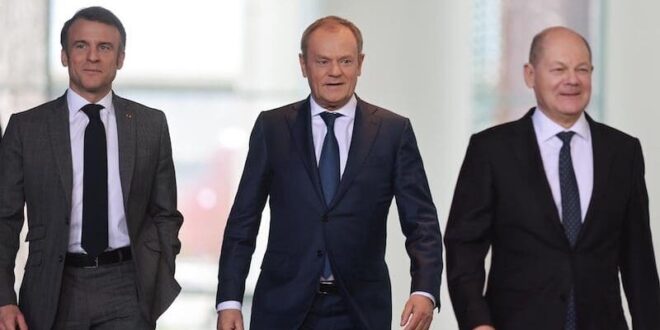German, French and Polish leaders highlighted on Friday (15 March) a joint set of priorities in supporting Ukraine, including stronger defence industrial cooperation, to quell rumours of disunity.
Talks between the three leaders – in the so-called ‘Weimar Triangle’ format – came after weeks of tensions between France and Germany over Europe’s war strategy.
French and German leaders traded barbs after an international Ukraine support conference in Paris earlier this month, where French President Emmanuel Macron publicly floated the idea of potentially sending Western troops to Ukraine – which was very quickly dismissed by his German counterpart.
Speaking to reporters in Berlin, the three leaders were keen to emphasise their unified support for Ukraine and their alignment regarding military priorities, as they discussed how to increase support to the country following the Paris Conference, even though they did not present any new initiatives.
“What we have agreed on, and the atmosphere today, show clearly that the evil rumours about tensions and disagreements between European capitals are not true,” Tusk said.
Macron, for his part, said that “we also want to show that all three of us as part of the Weimar Triangle agree, that all three of us are serious about supporting Ukraine”.
Notably, the French leader appeared to offer reassurance that Paris was not interested in pushing for the direct involvement of Western allies in the war in the short term.
“We will never take the initiative to escalate [this conflict],” Macron said.
Barely 24 hours earlier, Macron had refused to set limits on a possible response to Russia, repeating that he accepts the possibility of a French involvement, in a TV interview meant to win over the public to his strategy.
However, despite Friday’s show of unity – which came a week before a crucial EU summit discusses the sustainability of long-term military aid to Ukraine – the three leaders did not take questions from the press.
Boosting cooperation with Ukraine
Enhancing the production of military equipment, “in collaboration with partners in Ukraine”, was one of the key priorities Scholz mentioned after the meeting.
With that, France and Germany – whose military-industrial complexes are extensive and protected by the governments – and Poland, which pledged to spend 4% of GDP on defence in coming years, support the idea of a closer industrial cooperation with a country at war, which was previously pitched by the Ukrainians.
The joint approach comes after the European Commission proposed its European Defence Investment Programme (EDIP) to boost weapons manufacturing capacities across the bloc, which would involve Ukraine as a quasi-EU member state.
The proposal is rather innovative since countries at war are usually considered unsafe for investment by companies, and Ukraine’s industry is not part of the EU single market, meaning it does not share the same requirements.
As another priority, Scholz named buying more weapons for Ukraine, including from producers outside the EU, which France had long been opposed to.
Furthermore, the partners vowed to focus on creating a capability coalition for missiles among Kyiv’s Western allies, and on strengthening joint EU military support through the European Peace Facility.
 Eurasia Press & News
Eurasia Press & News



